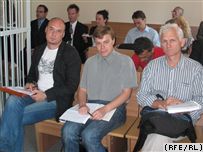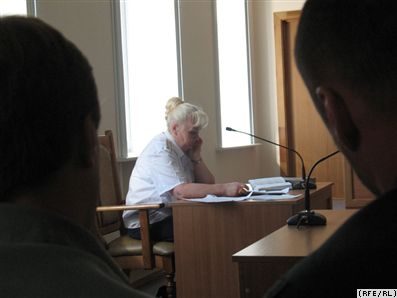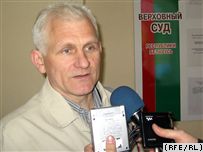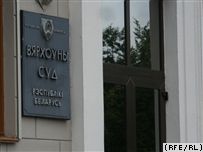The formal reason for the state registration denial to the civil human rights association Nasha Viasna was incorrect or distorted information in the list of the founders, also some doubts considering the legal address of the organization.
The plaintiffs argued the aforementioned shortcomings could be corrected in the process of the registration. They have been repeatedly trying to get the NGO registered since its predecessor human rights organization Viasna was liquidated in 2003.
According to the founders of Nasha Viasna, it must be an interest of Belarus just like any other state to let human rights defenders work freely and legally.
Still, on 12 August, having heard the explanations of the plaintiffs, a representative of the Ministry of Justice and prosecutor Kostrykava (who upheld the non-registration of Nasha Viasna), the Supreme Court stated that “the appeal of Bialiatski, Labkovich and Stefanovich (Nasha Viasna founders – author) cannot be satisfied”.
According to the Court “it is a right, not an obligation of the Ministry of Justice to provide the opportunity for correction of defects”.
“No organization means no problem for authorities”
 One of the plaintiffs Valiantsin Stefanovich told the Radio Liberty (in Belarusian only) the founders were going to appeal against a judge’s (Mr Tserakh – RL) decision to the Chairman of the Supreme Court.
One of the plaintiffs Valiantsin Stefanovich told the Radio Liberty (in Belarusian only) the founders were going to appeal against a judge’s (Mr Tserakh – RL) decision to the Chairman of the Supreme Court.
An appeal to the UN Human Rights Committee will also be submitted, he said. “Authorities will never be able to silence us“, – told Mr Stefanovich.
Another founder of Nasha Viasna Ales Bialiatski said the decision was obviously political and purely formal. “A couple of mistakes with commas or full stops were enough for them to turn the whole appeal down. The Ministry of Justice was ordered to deny us registration, this is what they did. Unfortunately, the government opted for “no organization – no problem” position. Obviously, we do not have a freedom of association in Belarus. Authorities strongly control the process and restrain civic rights”.
The name of Nasha Viasna (Our Spring) seemed suspicious
The hearing at the Supreme Court of Belarus on Nasha Viasna founders’ appeal started on 10 August.
 The news was hardly covered by the state-controlled media in Belarus, contrary to a decision of the Government which allegedly facilitated the registration of NGOs and political parties.
The news was hardly covered by the state-controlled media in Belarus, contrary to a decision of the Government which allegedly facilitated the registration of NGOs and political parties.
During the hearing, officials of the Ministry of Justice failed to keep the mask of political impartiality on.
The representative of the Ministry in court Aliaksandr Kharyton, who was among Belarusian officials listed as “persona-non-grata” by the Western countries, said he had “no interest in visiting” the EU or US. “It is up to my opponents to go to those countries. <...> Obviously, they need to report their bosses/masters abroad on how they spend their money for assignments”.
He even claimed the name of Nasha Viasna (Our Spring) suspicious and grammatically wrong.
 “A capital letter is used for the word “spring”, contrary to the rules of Belarusian grammar. Therefore, there are certain grounds to suppose that what the founders of the NGO mean is not a season, but something different. Moreover, they are sure that some kind of “their” spring exists or is likely to arrive. Not like a season, but like something else, only they know what”, – shared Mr Kharyton, left, as an argument against registration of Nasha Viasna at the Supreme Court of Belarus.
“A capital letter is used for the word “spring”, contrary to the rules of Belarusian grammar. Therefore, there are certain grounds to suppose that what the founders of the NGO mean is not a season, but something different. Moreover, they are sure that some kind of “their” spring exists or is likely to arrive. Not like a season, but like something else, only they know what”, – shared Mr Kharyton, left, as an argument against registration of Nasha Viasna at the Supreme Court of Belarus.
According to the founders of Nasha Viasna, it was the last attempt to legalize the activities of the NGO. Still, the human rights defenders declare they are not going to stop working.
Anybody acting on behalf of an unregistered NGO risks being jailed for up to 2 years according to the repressive Belarusian Criminal Law.
Belarusian HRH and HRHF Statement:
See, Belarusian HRH and HRHF Statement, 14 August 2009
Also see:
- Ales Bialiatski: The process of registration is of no less importance to us as human rights activists as the fact of registration, Viasna, 13 August 2009
- Supreme Court of Belarus: “Nasha Viasna” should not be registered, Belarusian HRH, 12 August 2009
- Follow-up note on the view Belyatsky et al. vs. Belarus, HRHF, 30 June 2009
- Non-registration as an instrument of punishment, Belarusian HRH, 11 June 2009





